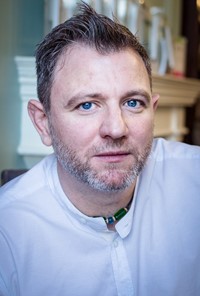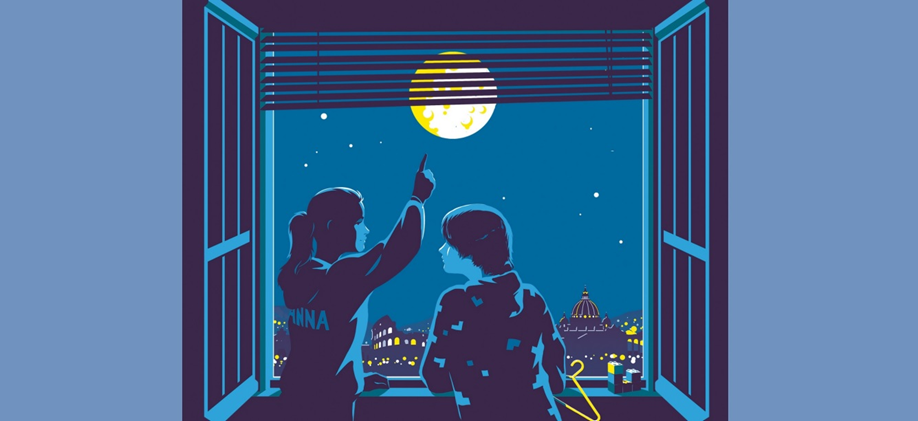Brian Conaghan


About Author
Brian Conaghan lives and works in the Scottish town of Coatbridge. He was a teacher for many years and taught in Scotland, Italy and Ireland, before studying creative writing at the University of Glasgow. His novel When Mr Dog Bites was shortlisted for the 2015 Carnegie Medal. The Bombs That Brought Us Together won the 2016 Costa Children's Book Award, The Weight of a Thousand Feathers won the 2018 Irish Book Award for Teen/YA Book of the Year, and We Come Apart, a verse novel co-authored with Carnegie Medal-winner Sarah Crossan, won the 2018 UKLA Book Award. His middle-grade novels include Cardboard Cowboys and Swimming on the Moon, which are full of his trademark heart, humour and crackling dialogue.
Interview
Swimming on the Moon (Bloomsbury Children's Books)
February 2023
Award-winning author Brian Conaghan's new middle-grade novel, Swimming on the Moon (Bloomsbury Children's Books), explores a family in trouble through the eyes of the 12-year-old daughter Anna and her twin brother Anto, who is autistic, and how they respond to their parents' planned separation. Brian Conaghan talked to ReadingZone about his writing, drawing on real life for his characters, researching autism, and what he'd like his readers to take from Swimming on the Moon.
Read a Chapter from Swimming on the Moon

Q&A with Brian Conaghan
1. How did you become a writer, and what kinds of books do you enjoy writing?
I did a Creative Writing course at university, which started me on the path of becoming a writer. I enjoy writing books about interesting characters with interesting voices and interesting stories to tell.
2. Can you tell us what your latest novel, Swimming on the Moon, is about and why you chose this title?
Swimming On the Moon is basically a book about a family falling apart through the eyes of a twelve year old, Anna. Her parents are going through a separation and Anna tries to stop this from happening. The title is related to something that's impossible to do, which feels a lot like trying to keep the family together.
3. The story is told by Anna, how did her voice develop? Why did you decide to include her daydreams of the past and possible (if unlikely) future experiences?
Anna's voice developed over a few rewrites; getting a 12 year old girl's voice accurate is tough, but it helps when if, like I do, have a daughter of a similar age. I decided to put the daydreams in because I felt it was important for Anna to have her own separate and dreamlike thoughts away from the book's main narrative strand. These are also certain desires she has.
4. The novel explores parental separation, and the impact it can have on children. How did you research this?
At my age it's unusual not to have been touched by separation, whether it's through a family member or friend's experience, so I leaned heavily on that; and seen through the eyes of a child seemed much more enticing to me. I think their innocence and (mis) understandings of events was fertile ground for me as a writer.
5. You feature twins in this family; how did the relationship between Anna and Anto develop?
No development required. I wanted to tap into the experience I had with my own sister, who is only one year older. That relationship bobbed and weaved, in a good and bad sense, much like Anna and Anto's.
6. What were the challenges for you as a writer in portraying a child, Anto, with autism?
The challenges were many, but it was always vital to portray Anto as accurately, sensitively and respectfully as possible. I did a lot of research on his condition and had a sensitivity reader who worked with non-verbal autistic kids, which was invaluable throughout the process.
7. You also explore the line between being a sibling and being a carer, as Anna is the person who understands Anto the most. Why is it important for children to hear carers' stories?
I never wrote Anna as a carer; I wrote Anna as a caring person, therein lies the difference. It's important to hear a wide range of stories, not one topic usurps the other.
8. Other than a wonderful reading experience, what would you like your readers to take from Swimming on the Moon?
As always, I want my readers to be entertained throughout the reading experience. I also want them to feel something: joy, sadness, elation for example. I also don't mind if they toss the book aside and think it's terrible. That's the subjectivity of any artform.
9. Where and when do you prefer to write? What are you writing currently?
I have a writing office (shed) where I write in the morning and afternoon. If I'm writing at night I will do that in my dining room with my records playing in the background. At the moment I'm just putting the finishing touches on a YA novel which is set in my hometown of Coatbridge.
10. What does a favourite, work-free day look like for you?
A long sleep followed by a an hour, at least, of reading in bed. Then I'll get up have a nice brunch. Then I'd go to see a movie at the cinema in the late afternoon, when the place is usually empty, and I'd finish off the day/night by seeing some live music or football. Bliss!
11. What kind of books do you enjoy reading? Have you read any children's books recently that you could recommend to our readers?
I really enjoy reading non-fiction books; true crime, politics, sport and music being particular favourites of mine. Sadly, I haven't read any children's books of late, but I'd recommend anything from fellow Scot, Claire McFall. Her books are devastatingly good.
 Swimming on the Moon
Swimming on the Moon
 The M Word
The M Word
 The Weight of a Thousand Feathers
The Weight of a Thousand Feathers
 The Bombs That Brought Us Together: WINNER OF THE COSTA CHILDREN'S BOOK AWARD 2016
The Bombs That Brought Us Together: WINNER OF THE COSTA CHILDREN'S BOOK AWARD 2016
 When Mr Dog Bites
When Mr Dog Bites
